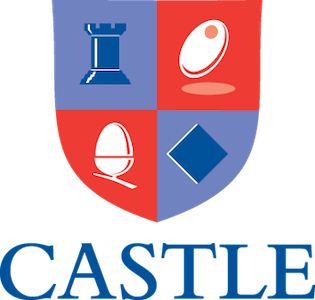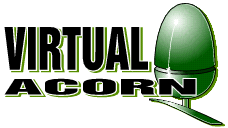Related Research Articles

BBC BASIC is a version of the BASIC programming language released in 1981 as the native programming language for the BBC Micro home/personal computer, providing a standardized language for a UK computer literacy project of the BBC. It was written mainly by Sophie Wilson.

Acorn Computers Ltd. was a British computer company established in Cambridge, England, in 1978. The company produced a number of computers which were especially popular in the UK, including the Acorn Electron and the Acorn Archimedes. Acorn's BBC Micro computer dominated the UK educational computer market during the 1980s.

The Risc PC is Acorn Computers's RISC OS/Acorn RISC Machine computer, launched on 15 April 1994, which superseded the Acorn Archimedes. The Acorn PC card and software allows PC compatible software to be run.

RISC OS is a computer operating system originally designed by Acorn Computers Ltd in Cambridge, England. First released in 1987, it was designed to run on the ARM chipset, which Acorn had designed concurrently for use in its new line of Archimedes personal computers. RISC OS takes its name from the reduced instruction set computer (RISC) architecture it supports.

The Iyonix PC was an Acorn-clone personal computer sold by Castle Technology and Iyonix Ltd between 2002 and 2008. According to news site Slashdot, it was the first personal computer to use Intel's XScale processor. It ran RISC OS 5.

Castle Technology Limited, named after Framlingham Castle, was a British computer company based in Cambridge, England. It began as a producer of ARM computers and manufactured the Acorn-branded range of desktop computers that run RISC OS.
The Fourth Dimension (4D) was a major video game publisher for the BBC Micro, Acorn Electron, Acorn Archimedes and RiscPC between 1989 and 1998. Previously, The Fourth Dimension had been known as Impact Software, which specialised mainly in BBC Micro games. Some of 4D's staff had worked for Superior Software. Notable release included Cyber Chess, Stunt Racer 2000, Galactic Dan and Chocks Away.

Star Fighter or Star Fighter 3000 is a 3D flight-based shoot-em-up. The gameplay is mission based and involves elements of strategy and planning. The player can order wingmen to fly in formation and attack specific targets.

RISC OS Open Ltd. is a limited company engaged in computer software and IT consulting. It is managing the process of publishing the source code to RISC OS. Company founders include staff who formerly worked for Pace, the company which acquired RISC OS after Acorn's demise.
RISCOS Ltd. was a limited company engaged in computer software and IT consulting. It licensed the rights to continue the development of RISC OS 4 and to distribute it for desktop machines from Element 14 and subsequently Pace Micro Technology. Company founders include developers who formerly worked within Acorn's dealership network. It was established as a nonprofit company. On or before 4 March 2013 3QD Developments acquired RISCOS Ltd's flavour of RISC OS. RISCOS Ltd was dissolved on 14 May 2013.

Drobe was a computing news web site with a focus on the RISC OS operating system. Its archived material was retained online, curated by editor Chris Williams until late 2020.

Acorn Arcade is a computing resource website with a focus on the RISC OS operating system and its gaming scene. It has been recognised by Acorn User magazine and was an award winner at the Wakefield Acorn Computer Show.
The Icon Bar is a computing and technology website with a focus on the RISC OS computer operating system.
NCOS is the graphical user interface-based operating system developed for use in Oracle Corporation's Network Computers, which are discontinued. It was adapted by Acorn Computers from its own RISC OS, which was originally developed for their range of Archimedes desktop computers. It shares with RISC OS the same 4 MB ROM size and suitability for use with TV displays.

Acorn C/C++ is a set of C/C++ programming tools for use under the RISC OS operating system. The tools use the Norcroft compiler suite and were authored by Codemist and Acorn Computers. The tools provide some facilities offered by a fully integrated development environment.
RISC OS, the computer operating system developed by Acorn Computers for their ARM-based Acorn Archimedes range, was originally released in 1987 as Arthur 0.20, soon followed by Arthur 0.30, and Arthur 1.20. The next version, Arthur 2, became RISC OS 2 and was completed and made available in April 1989. RISC OS 3 was released with the very earliest version of the A5000 in 1991 and contained a series of new features. By 1996 RISC OS had been shipped on over 500,000 systems.

VirtualAcorn is the brand name of several commercial emulators of Acorn Computers computer hardware platforms.

In computing, Aemulor is an emulator of the earlier 26-bit addressing-mode ARM microprocessors. It runs on ARM processors under 32-bit addressing-mode versions of RISC OS. It was written by Adrian Lees and released in 2003. An enhanced version is available under the name Aemulor Pro.
Impression is a desktop publishing application for RISC OS systems. It was developed by Computer Concepts and initially made available in pre-release form during 1989, having been demonstrated in February 1989 at the Which? Computer Show and subsequently announced as being available from June 1989. The "completed" version was eventually delivered on 18th January 1990.
References
- ↑ Foundation - News from MicroDigital Ltd Archived 9 July 2012 at archive.today
- ↑ http://chrisacorns.computinghistory.org.uk/AfterAcorn/Microdigital.html#Omega Chris's Acorns - Omega
- ↑ Drobe - Omega production saga continues